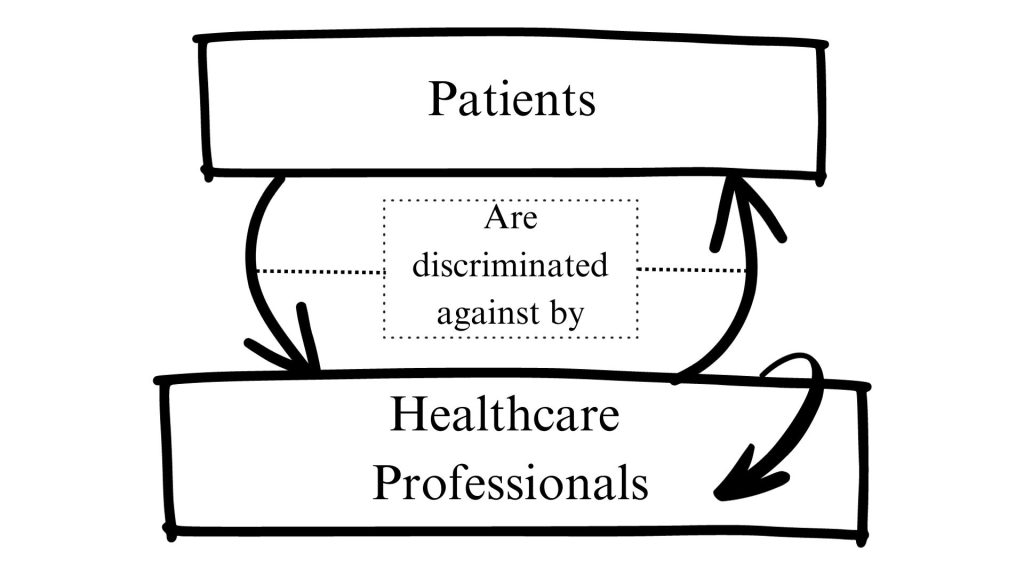Discrimination is a problem that exists across the world in many different contexts and settings. The sad truth is that discrimination also exists in health care settings across the world.
Individuals seeking care or health services are discriminated against due to factors such as race, ethnicity, gender, or even socioeconomic status. Discrimination, unfortunately, comes in many shapes and sizes, all with their own detrimental effect onto the health of those being discriminated against.

Discrimination matters in health care because it can lead to the people being discriminated against being treated differently. This means, inevitably, that they receive poorer care and treatment compared to others.
This, in turn, can cause them to have poorer health outcomes due to poorer treatment in the long run; and in some cases, can put them off getting care altogether.
Discrimination in health care is particularly visible against people living with the Human Immunodeficiency Virus (HIV). In the first few decades of the onset of HIV, individuals contracting HIV were treated very badly as it was perceived that they were ‘at fault’ of contracting the disease due to their ‘habits’ or ‘behaviours’.
Due to this perception from health care professionals, they have been treated badly, and sometimes even abused in the course of getting treatment. These often led to individuals living with HIV shunning health care facilities and not bothering to go for treatment, which would have helped them regain an important part of their lives.
Today, discrimination against people living with non-communicable diseases (NCDs) is also beginning to rear its ugly head in the health care landscape. People living with NCDs have reported being discriminated against. Some have even reported that health care professionals are not so keen on treating them to the best of their abilities as they are ‘felt’ to have contributed to their health problem.
For example, one patient even reported a health care professional stating aloud that “Haiya, what’s the point of treating you so much anyway, we know your (liver) cancer came from drinking right. So you do, you kena lah…”
Discrimination, unfortunately, also is seen extending both ways in the health care setting. Health care professionals are also discriminated against in multiple settings all around the world, sometimes by patients, but in some cases, they are discriminated against by other health care professionals.
Patients refuse to see certain health care professionals, alleging sometimes that “you are only a nurse right, only a doctor will be able to manage my condition”.
This sometimes boomerangs onto the patient themselves, as this can cause delayed care, and sometimes even wilful withholding of care to them. However, there are detrimental effects on health care professionals over the long run as well.
Health care professionals facing discrimination from patients often quit or become ‘burned out’. In some cases, they become hostile and defensive, choosing not to engage patients in a meaningful and effective way for fear of being rebuked or even abused.
This can lead to poorer patient care in the long run, with effects not only seen among health professionals but also among patients.
Health care professionals also face discrimination from their ‘own’, namely other health care professionals. Bullying of junior personnel, or even discrimination of certain types of health care professionals because they are ‘felt’ to be ‘lower than us’ is an attitude that still exists within the health care system, with detrimental effects to all, including patients.
Discrimination is not an easy subject to address. especially within multicultural settings. Some senior health care professionals have even deflected attempts to address discrimination, claiming that where if it happens, every patient will feel that they are being discriminated against, and no one will be allowed to treat patients in an open and honest manner.
Unfortunately, discrimination in health care settings is a real and existent issue, and the net outcome is always a poorer one for the end-users, namely the patients. Serious and honest efforts have to be made in order to address discrimination within health care settings, so that we can provide better holistic care.
This article was written by Dr Janice Hew Pei Fang, Mohamad Ishak Ahmad Abir, Thaarenee Wiswannadan, Nariza Alysa Azryn, Dr Jessica Anne Canute, Mahirah Ma’som, Chan Wan Thung, Dr Murallitharan Munisamy, and Dr Saunthari Somasundaram from NCD Malaysia.
NCD Malaysia is the Malaysian chapter of the Global NCD Alliance, comprising 16 organisations that advocate for people living with non-communicable diseases. For further information about NCD Malaysia, please visit the NCD Malaysia Facebook and Instagram pages.
- This is the personal opinion of the writer or publication and does not necessarily represent the views of CodeBlue.








